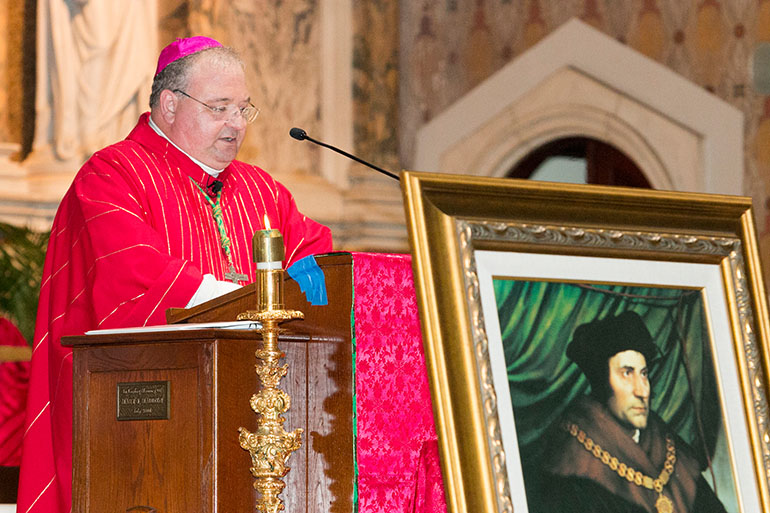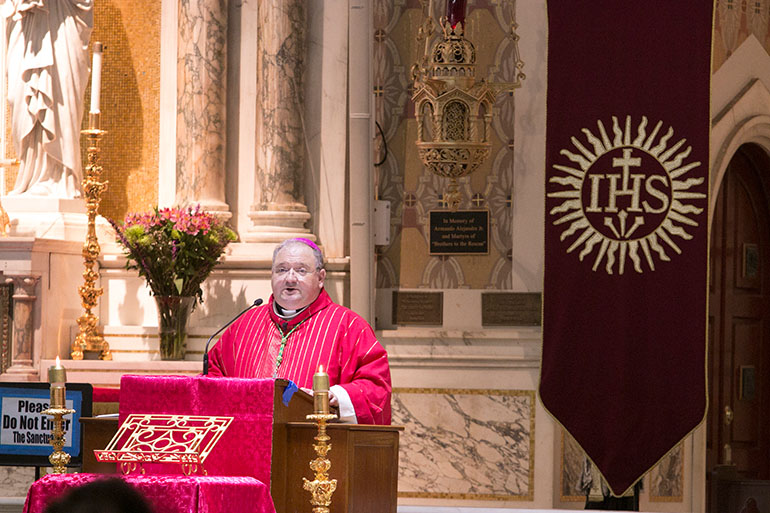By Bishop Peter Baldacchino -

Photographer: ANA RODRIGUEZ-SOTO | FC
Behind a painting of St. Thomas More, patron saint of lawyers, Auxiliary Bishop Peter Baldacchino delivers his homily to members of the Miami Catholic Lawyers Guild gathered at Gesu Church Oct. 26 for their annual Red Mass.
Auxiliary Bishop Peter Baldacchino preached this homily during the annual Red Mass hosted by the Miami Catholic Lawyers Guild and celebrated Oct. 26, 2016 at Gesu Church, downtown Miami.
The readings we heard proclaimed a few moments ago are the very same readings that the universal church proclaims for today’s Mass throughout the world. Thus, they are a Word of God that is being directed to all Christians, everywhere. However, within the context of this Mass we are celebrating here at Gesu Church, as we pray for judges, attorneys, students, and government officials � in brief, persons who have been called to be ministers of justice and truth in various areas of society � this Word of God acquires a particular meaning.
People nowadays find the passage from the letter to the Ephesians that has been proclaimed in our midst today quite challenging, and perhaps even unfit for our judicial systems and our modern socio-political mentality.
Its opening statement is a family life rule that appears to be a good model for the daily life of all of you. Children, be obedient to your parents, and parents, do not provoke your children to anger. I wish this has been the experience of your life. I pray that it may happen soon if it has not been the case, and I challenge you to put it into practice.
However, it is the second part of the first reading that calls to attention for its content, since it presents an instruction that apparently does not conform to what modern man believes. Slaves, be obedient to your human masters, not only when being watched, but as slaves of Christ, doing the will of God from the heart, willingly serving the Lord and not men.
Apparently this declaration of St. Paul goes against what are the basic human rights of every person, to be treated fairly, not to be exploited or taken advantage of, not to work without adequate compensation, etc...
Some religious authors have debated at length whether St. Paul condoned, excused, justified or even promoted slavery or forced labor!
Truly, in the sentence that follows St. Paul encourages masters to treat their slaves kindly, but in other letters, such as the one to Timothy, he clearly states that slaves must obey their masters even when they are not treated well.
Clearly, condemnation of slave labor and slavery is nowadays accepted worldwide, and all over, world jurisdictions ban it and sanction its violation.
The Catholic Church has clearly stated its opposition to any form of slavery, on the basis of the natural rights of every child of God.
Sociologist Rodney Stark described the theological analysis of St. Thomas on the issue in the following words: in his overall analysis of morality in human relationships, Aquinas placed slavery in opposition to natural law, deducing that all "rational creatures" are entitled to justice.
And as St. John Paul II stated about 600 years after Aquinas: The trade in human persons constitutes a shocking offence against human dignity and a grave violation of fundamental human rights. Already the Second Vatican Council had pointed to "slavery, prostitution, the selling of women and children, and disgraceful working conditions where people are treated as instruments of gain, rather than free and responsible persons" as "infamies" which "poison human society, debase their perpetrators" and constitute "a supreme dishonor to the Creator." Such situations are an affront to fundamental values which are shared by all cultures and peoples, values rooted in the very nature of the human person.
So, what is St Paul talking about, by inviting slaves to obey masters (even the unjust ones!)?
Should they not stand up and defend their rights as human beings?
Should they not demand the respect that is due to every person?
It seems that the primitive Church had a different approach to the question.
WHY?
Is this just ancient history, a past law from the “bronze age” that nowadays is outdated? Clearly, in such a case, we could easily dismiss this passage with a “Not Applicable” stamp, and move on to the next reading.
Or is this the ultimate sacrifice that God requests of a few particularly chosen persons?
Indeed, there were in the Catholic Church religious orders that were dedicated to the ransom of slaves; so much so that many monks offered themselves to take the place of people that had been kidnapped � particularly those in the Mediterranean basin � by the Moors.
However, if St. Paul presents a model of behavior that at first sight goes against our common values, it is not because he is presenting a behavioral model or a socio-political rule that should be implemented as a general norm, worldwide.
The sociological reality of the world back then, was such that the Christian communities were a strikingly small minority. Sociologists say that there were no more than a few thousand Christians all over the Mediterranean area by the time St. Paul wrote his letters! Most of them were slaves, or belonging to the lower social classes. Clearly the message of equality and love of the Gospel soon attracted those who had little to lose.
However, many masters, too, rapidly converted to Christianity!
Why? Precisely because of the witness of love manifested by their servants. Christian slaves authentically put into practice the commandment of St. Paul, with their whole heart. Indeed, they loved their masters, served them with respect, did not demand to be set free. And this was very uncommon, even back then!
Christians truly put into practice the rule of the Sermon on the Mount, to love also even those who were unjust to them.
So much so that Tertullian, a Christian writer of the year 200 A.D., could say while speaking about the view the pagans had regarding Christians: "Look," they say, "how they love one another" (for they themselves hate one another); "and how they are ready to die for each other" (for they themselves are readier to kill each other).
And St. Justin Martyr described Christian love with these words: “We used to hate and destroy one another and refused to associate with people of another race or country. Now, because of Christ, we live together with such people and pray for our enemies.”
In this sense, the love and obedience of the early Christians was not lived by them as a renunciation � albeit willing � of their personal freedom, quite the contrary! It was for them the expression of TRUE FREEDOM, the freedom to love everybody, to love as Christians discovered that they were loved by God. Christian freedom does not depend on external or physical circumstances: One can be free even if he is jailed, a slave or bound to a hospital bed. True freedom is to be able to do the will of God and to love beyond human limitations. When the boundaries of internal slavery are broken, and man becomes free to love, his true condition changes, and selfless love becomes possible!
In this sense the Gospel proclaimed today contains a warning to all those who profess the name of Christian: “Strive to enter through the narrow gate, for many, I tell you, will attempt to enter but will not be able to.”
In a society like the one we live in today, these words should strike a chord in the hearts of all Christians.
In the Roman Empire, Christians showed love as a sign of the new nature that baptism was infusing into Christians, a nature that was similar to the one of Jesus Christ, “who, being in very nature God, did not consider equality with God something to be used to his own advantage, rather, he made himself nothing by taking the very nature of a servant, being made in human likeness.”
So we too are called to strive to enter through the narrow gate and put the Gospel words into practice.
We too must enter the gate of Love, Mercy, Truth, self-sacrifice; the gate of service to the other one, that you all in your service, as active or prospective judges, lawyers, civil servants, are all called to embrace.
Pope Francis is not sparing any words to remind all of us of the truth of the Gospel.
It is not enough to say “we have been in your company,” as St. Luke tells us, in order to call ourselves Christians and Catholics.
The Church is YOU; Christ in YOUR workplace has to be made present through YOU.
YOU are called to pursue your vocation to bring Christ into the daily circumstances of life.
Nowadays, this often means to pass through the narrow gate of rejection, of being despised, of losing a job because you are being driven out of a law firm because of your beliefs, or because your understanding of marriage does not match the commonly accepted one.
The narrow gate of losing human advantages or of being subject to severe punishment.
The narrow gate of personal risk in speaking the truth: DO NOT BE AFRAID. Truth must be proclaimed.
As Alexander Solzhenitsyn boldly said in a time perhaps darker than the one we are in: “One word of truth is more powerful than all the armies of the world.”
Jesus Christ did not promise us a fancy lifestyle but a CROSS. Be supportive of the truth, courageous and honest.
Enter through the narrow gate.
Do not be fooled by other doors, wide, open, spacious, well-lit and with lots of applause. They will not give you happiness here, and will in the long run be a source of further pain and injustice.
If Christ is in you, you can accomplish it. This, in spite of external appearances, is a Good News, since as St. Paul told us: “I can do all things through Christ who strengthens me.” Ask the Lord to be strengthened by Him. He is not demanding from you a superhuman effort or sacrifice. He wants to live in you, to give you His strength and to allow you to experience the power of His Holy Spirit. And through this, to live in the freedom of the children of God.

Photographer: ANA RODRIGUEZ-SOTO | FC
Auxiliary Bishop Peter Baldacchino delivers his homily to members of the Miami Catholic Lawyers Guild gathered at Gesu Church Oct. 26 for their annual Red Mass.

